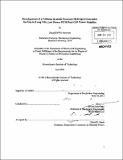Development of a lithium hydride powered hydrogen generator for use in long life, low power PEM fuel cell power supplies
Author(s)
Strawser, Daniel DeWitt
DownloadFull printable version (10.36Mb)
Other Contributors
Massachusetts Institute of Technology. Dept. of Mechanical Engineering.
Advisor
Steven Dubowsky.
Terms of use
Metadata
Show full item recordAbstract
This thesis studies a hybrid PEM fuel cell system for use in low power, long life sensor networks. PEM fuel cells offer high efficiency and environmental friendliness but have not been widely adopted due to cost, reliability, and the problem of hydrogen storage. This thesis focuses on the problem of hydrogen storage. Lithium hydride is selected for study because of its high hydrogen content and because it produces hydrogen through a chemical reaction with water. Control of the lithium hydride hydrolysis reaction is investigated. Active and passively-controlled hydrogen generators that rely on lithium hydride are designed and experimentally studied. A model is created to explain the system's pressure response. The passive hydrogen generator is experimentally tested in a 2 month benchtop fuel cell experiment. The results of the study suggest that it is possible to design a simple, passive generator that controls the hydrogen pressure at an operating point. However, over longer time periods of 1-3 months, the rate of reaction slows significantly and byproduct formation prevents full utilization of the lithium hydride. These limits complicate the design of a power supply relying on lithium hydride.
Description
Thesis (S.M.)--Massachusetts Institute of Technology, Dept. of Mechanical Engineering, 2012. Cataloged from PDF version of thesis. Includes bibliographical references (p. 87-90).
Date issued
2012Department
Massachusetts Institute of Technology. Department of Mechanical EngineeringPublisher
Massachusetts Institute of Technology
Keywords
Mechanical Engineering.